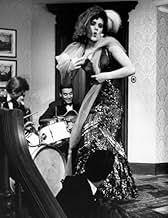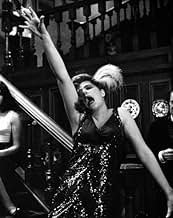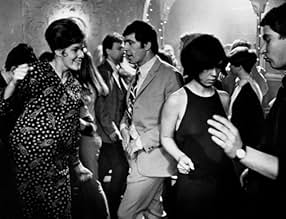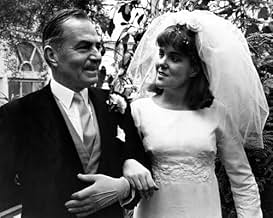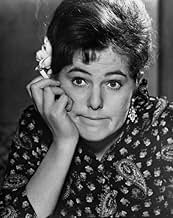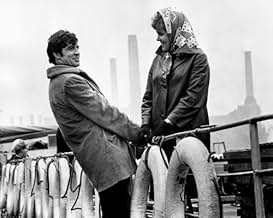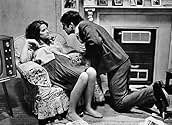VALUTAZIONE IMDb
6,9/10
4474
LA TUA VALUTAZIONE
Aggiungi una trama nella tua linguaA young woman juggles an unwanted suitor's advances and her desire for an exciting life, envying her free-spirited roommate's social whirlwind.A young woman juggles an unwanted suitor's advances and her desire for an exciting life, envying her free-spirited roommate's social whirlwind.A young woman juggles an unwanted suitor's advances and her desire for an exciting life, envying her free-spirited roommate's social whirlwind.
- Regia
- Sceneggiatura
- Star
- Candidato a 4 Oscar
- 6 vittorie e 17 candidature totali
Jolyon Booth
- Registry Office Clerk
- (as Jolyan Booth)
Lewis Alexander
- Party Guest
- (non citato nei titoli originali)
Jack Arrow
- Party Guest
- (non citato nei titoli originali)
Richard Atherton
- Waiter
- (non citato nei titoli originali)
Roy Beck
- Party Guest
- (non citato nei titoli originali)
Hyma Beckley
- Party Guest
- (non citato nei titoli originali)
Recensioni in evidenza
Good performances from Redgrave, Mason, Rampling and Bates. A modest film that found international approval. In 1966, while it may have seemed shocking to hear UK girl Charlotte Rampling tell Alan Bates that she had "destroyed" two of his already, it's worth remembering that an American girl couldn't have a legal abortion unless there were extenuating circumstances. Roe v. Wade was still several years away. The wholesome longings of Goergie are sharply contrasted with her roommate, the ice cold Meredith. The lead was originally offered to Vanessa Redgrave and when she backed out her younger sister Lynne was cast. She was overwhelmingly brave playing Georgie as a girl you liked enough that when she does something embarrassing you can't help but flinch. It happens a lot. As she falls and fails she finds a life of her own. And that is oddly inspirational.
Reviews seem to miss the real theme of this film, which is about the voyage of self-discovery of a person who feels out of sync with her world and tries to define, or redefine, her own true self. This theme has a strange attraction for me -- I identify with Georgy's search, I think, because of my own feelings of misalignment with the world or alienation. Unfortunately, as a male, it seems that the principal characters in films addressing this theme with sensitivity are invariably women. Perhaps in our society men are expected not to have such uncertainties about themselves or to suppress them, so no films are made. Two other films I enjoyed because of their similar themes are "Muriel's Wedding" and "Thelma and Louise". If you like, you can tell me I'm reading far more into this film than was ever intended, reminiscent of Mark Twain's famous warning. But you won't convince me! Alan
Alan Bates' eccentric performance outshines in this interesting and whimsical film. It is certainly an odd mix of drama and comedy as Bates never seems to act seriously around what essentially is a perverse story with cutting moments, particularly Charlotte Rampling's performance in the hospital after her baby is born. Redgrave is perfect as the dowdy and shy Georgie - like her description in the book, she appears plain but strangely attractive. Mason again appears as the downtrodden anti-hero, never quite getting what he wants at the end of the film - in this respect he always seems typecast. There's always something I like about these B/W 1960's films with their gritty London location filming and this one is no exception.
Overall, I recommend this flick. I particularly liked the character of Georgy ...the way she tries to cover up any vulnerability with wit/ spunk..she MAKES the movie. But I can't help be bummed at the ending. Rationally, I approve of the ending, but find it disappointing at the same time..... It was more sensible,plausible and had more integrity than if they'd kept Georgy & Jos together...but...but... James Mason creeped me out through the whole movie (I mean, he watched her grow up..the old lecher!) and Alan Bates was soo ADORABLE (yes, he was selfish & immature too, I KNOW. He had potential for change??Maybe??) I supposed I'm just biased, Alan Bates (Alan Bates of the late '60s & '70s that is)being up there on my list of unconventional crushes.
I enjoyed "Georgy Girl" at the time of its original release, but hadn't thought about it until I recently viewed the DVD version. This revisit was well worth it: "Georgy Girl" is a delightful film.
Charlotte Rampling's Meredith is my favorite of the four main characters. Rampling has always been physically stunning, but it's her moody intellect within that keeps Meredith modern rather than a 60s icon who looks sensational in Mary Quant mini-dresses, a darker version of Julie Christie in "Darling" (a character who didn't have too much of a light side herself). Meredith is cool, in control, self-serving, brutal, and surprisingly honest about who she is. "You take me as me," she tells Jos (Alan Bates) as she cajoles him into marrying her, not so much because she's pregnant but because she's bored. It seems in Meredith's view, you can easily get rid of a pregnancy, but boredom requires more skill and is potentially a worse situation in which to find yourself. Other actresses could have successfully made Meredith a bitch, but Rampling makes her fascinating and thus strangely likable. When she exits the film, things go a bit limp, but then there's little left than to move the story to its inevitable conclusion.
Alan Bates plays Jos with such high physical and verbal energy he seems to be all the Marx Brothers rolled into one. His facial expression at the culmination of his strip during the 'I Love You' sequence suggested to me a nod to the great Harpo.
Lynn Redgrave made the role of Georgy so much her own it's difficult to believe the story that Vanessa Redgrave had been originally intended for it -- and even more difficult to imagine Vanessa playing scenes with Rampling.
The title song became a big hit at the time. In the film, the lyrics vary somewhat from the pop version, serving to set up the plot during the opening credits and then comment on its resolution at the end. In between, the song politely vanishes, leaving the classically influenced score by Alexander Faris to take over with its harpsichord riffs and its subtle playfulness. I especially liked the violin solo that accompanies the transition from orgasm to morning sickness.
The dialogue is often fast, overlapping, thrown away, or contains obscure (to me) cultural references, so it's worth enabling the English subtitles for DVD viewing. You wouldn't want to miss "Moss Bros", or Alan Bates' rapid-fire disrobing monologue, or Meredith's contempt for the concert at which she has just played violin: "Beethoven night. They're like animals."
Charlotte Rampling's Meredith is my favorite of the four main characters. Rampling has always been physically stunning, but it's her moody intellect within that keeps Meredith modern rather than a 60s icon who looks sensational in Mary Quant mini-dresses, a darker version of Julie Christie in "Darling" (a character who didn't have too much of a light side herself). Meredith is cool, in control, self-serving, brutal, and surprisingly honest about who she is. "You take me as me," she tells Jos (Alan Bates) as she cajoles him into marrying her, not so much because she's pregnant but because she's bored. It seems in Meredith's view, you can easily get rid of a pregnancy, but boredom requires more skill and is potentially a worse situation in which to find yourself. Other actresses could have successfully made Meredith a bitch, but Rampling makes her fascinating and thus strangely likable. When she exits the film, things go a bit limp, but then there's little left than to move the story to its inevitable conclusion.
Alan Bates plays Jos with such high physical and verbal energy he seems to be all the Marx Brothers rolled into one. His facial expression at the culmination of his strip during the 'I Love You' sequence suggested to me a nod to the great Harpo.
Lynn Redgrave made the role of Georgy so much her own it's difficult to believe the story that Vanessa Redgrave had been originally intended for it -- and even more difficult to imagine Vanessa playing scenes with Rampling.
The title song became a big hit at the time. In the film, the lyrics vary somewhat from the pop version, serving to set up the plot during the opening credits and then comment on its resolution at the end. In between, the song politely vanishes, leaving the classically influenced score by Alexander Faris to take over with its harpsichord riffs and its subtle playfulness. I especially liked the violin solo that accompanies the transition from orgasm to morning sickness.
The dialogue is often fast, overlapping, thrown away, or contains obscure (to me) cultural references, so it's worth enabling the English subtitles for DVD viewing. You wouldn't want to miss "Moss Bros", or Alan Bates' rapid-fire disrobing monologue, or Meredith's contempt for the concert at which she has just played violin: "Beethoven night. They're like animals."
Lo sapevi?
- QuizVanessa Redgrave backed out of the role of Georgy just before shooting started. Her sister Lynn picked up the part instead.
- BlooperIn the early scene at the piano where Georgy's father has brought her a dress to wear to a birthday party, she's wearing glasses when he starts to say, "Oh, please yourself," but not wearing them before he finishes the line.
- ConnessioniFeatured in The Lady with the Torch (1999)
I più visti
Accedi per valutare e creare un elenco di titoli salvati per ottenere consigli personalizzati
Dettagli
- Data di uscita
- Paese di origine
- Lingue
- Celebre anche come
- Georgy Girl
- Luoghi delle riprese
- Dame Clara Butt House, 7 Harley Road, London, Greater London, Inghilterra, Regno Unito(James Leamington's mansion)
- Azienda produttrice
- Vedi altri crediti dell’azienda su IMDbPro
Botteghino
- Budget
- 400.000 USD (previsto)
- Tempo di esecuzione
- 1h 39min(99 min)
- Colore
Contribuisci a questa pagina
Suggerisci una modifica o aggiungi i contenuti mancanti


